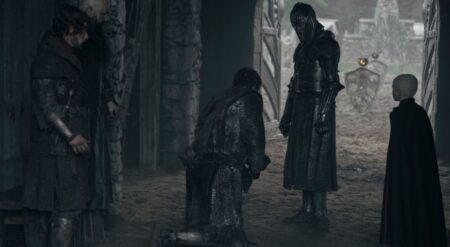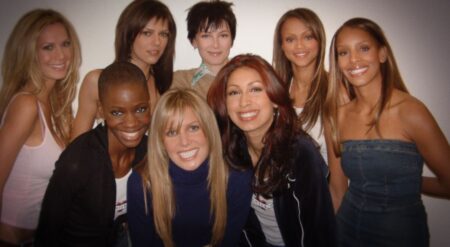
Conversations with Friends is the newest adaptation of Sally Rooney’s debut novel that arrived on Hulu on May 15th. Directed by Lenny Abrahamson and written by Alice Birch, the team that brought Rooney’s Normal People to life, they attempt to tackle a story that asks what is love and is it a finite resource? There are four main characters that viewers watch on this 12-episode journey exploring the aforementioned question. The show has a phenomenal cast consisting of Alison Oliver playing Frances, Sasha Lane playing Bobbi, Joe Alwyn portraying Nick, and Jemima Kirke as Melissa.
Frances and Bobbi are early 20-year-olds who are best friends as well as ex-girlfriends. The air between them feels ripe with adoration, tension, and unspoken love. Their introduction to us is done through their spoken-word poetry. Their call and response banter focuses on how silly they think men’s expectations of women are. They’re electric, funny, and cool. A married couple, Melissa and Nick, take notice of them, and from that night forward, all of their lives become intertwined. It’s a story that seems too familiar. Frances likes Nick and begins an affair with him. Bobbi likes Nick’s wife, Melissa. Frances is jealous of Melissa. Melissa is too preoccupied with her work to notice what’s going on.
Despite the show being about how four people’s relationships affect one another, Conversations with Friends is Frances’ story. With lots of still shots of Frances’ day-to-day life as a student, a friend, and a writer. She is slowly shown to viewers as lonely, cold, rigid, and aloof. The camera consistently follows her up close. Oliver’s physicality in her actions cannot be understated as she brings Frances to life. There is a distinct lack of her internal dialogue that propels the novel forward, but instead, viewers see an intimate window into Frances.
Certain scenes are of her fidgeting as she thinks about what to say to either Nick or Bobbi. She’s frantically nervous when she’s by herself. It’s a huge juxtaposition to how Frances acts around Nick. With Nick, she’s powerful, feeling an immense sense of pleasure over getting what she wants. Nick is passive, and for the first time, Frances feels in control of her body, her happiness, and her life.
Birch and Abrahamson do a lot of justice to capture the essence of these characters. As Frances navigates her relationships, I could think of no one better to play Bobbi than Lane does. Bobbi’s dialogue is the truest to the novel, and Lane’s delivery is nuanced and gritty. In Frances’ head, Bobbi is too cool for everyone else, doing what she wants and leaving everyone else in her wake. Although, Lane’s care in bringing Bobbi to life showcases the intense confusion, hurt, and love that Bobbi carries for Frances. Since Abrahamson likes to get close-up shots of his actors, Bobbi’s facial expressions are crucial to understanding the unspoken dynamic between her and Frances.
Melissa is another character that stands out. As a writer about to launch a book, she’s everything that Frances dreams of being, despite not knowing that herself. Kirke is posh, lively, and charismatic as Melissa. She knows how to make Birch’s dialogue bite as the oldest and most put-together person amongst the characters. Melissa delivers some of the most emotionally harrowing performances as she deals with learning of the affair and attempting to save her marriage. My favorite scene is a phone call that occurs where Melissa finally tells Frances that there are real consequences to her behavior.
Despite the cast being great, Conversations with Friends feels lacking. The setting is very minimal, almost barren. When Abrahamson isn’t putting the camera up close, the show feels spacious and too big for itself. At times, this approach works really well. It stands out during a trip Bobbi and Frances take to Croatia with Nick and Melissa. This story is focused on these characters’ feelings for one another, but there isn’t enough focus on introspection amongst them to make this show not feel hollow.

The bulk of the narrative occurs in Frances’ inner monologue in the book, which is forfeited for these still shots, close-ups, and occasional frames of Frances looking pensive and lonely. Oliver does a great job bringing Frances to life, but how she is framed can feel monotonous and unintriguing. With the script lacking a lot of what makes this novel so unique, viewers feel a growing sense of frustration as Frances refuses to vocalize her feelings, and we can see her anguish, but we can’t get into her head. The lack of depth for Frances is one of Conversations with Friends most significant flaws.
The most enormous disservice to this show is both its length and its lack of dialogue. There are lots of brilliant topics that viewers get snippets off. For instance, Frances is a self-proclaimed communist, but what does it mean if it’s a fleeting passing comment? Bobbi and Frances both despise how the patriarchy has sold women this fantasy of how to be pleasing to men, yet Frances seeks to please Nick in every way she can. Bobbi states that relationships and love can exist between two people, and they can also love other people.
Frances has endometriosis and has strong opinions about her body, but the dialogue treats it as a passing thought only to be brought up again near the end of the show. It feels disappointing that instead of depth and exploration, Conversations with Friends offers musings and brief intellectual dialogue. This show could be so much more if it were both longer and if the dialogue was fleshed out more.
I wish Conversations with Friends was better, both as a standalone show and as a literary adaptation. The show buckles under the weight of trying to capture the feelings of the novels without the actual exploration of the characters that made the book so special. Many viewers will see the hollowness of the show and will either love its minimalist approach or feel frustrated by it. I sit in the middle. I love the cast and slow reveal of Nick and France’s affair. The relationship dynamics that are never labeled but talked about, albeit much too quickly for my liking, are riveting and modern. What does it matter if you have sex with someone you love, but they love someone else too? What does it mean to be committed to each other and to also have the freedom to pursue other people who could fulfill you? Is marriage an actual promise of love or a way for society to control your life goals?
Conversations with Friends doesn’t have any of those answers, but it does tell you that sometimes love is messy enough to make you try to figure it out.
All episodes of Conversations with Friends will start streaming on May 15th, 2022, on Hulu.
Conversations with Friends
-
Rating - 8/108/10
TL;DR
I wish Conversations with Friends was better, both as a standalone show and as a literary adaptation. The show buckles under the weight of trying to capture the feelings of the novels without the actual exploration of the characters that made the book so special. Many viewers will see the hollowness of the show and will either love its minimalist approach or feel frustrated by it. I sit in the middle.






